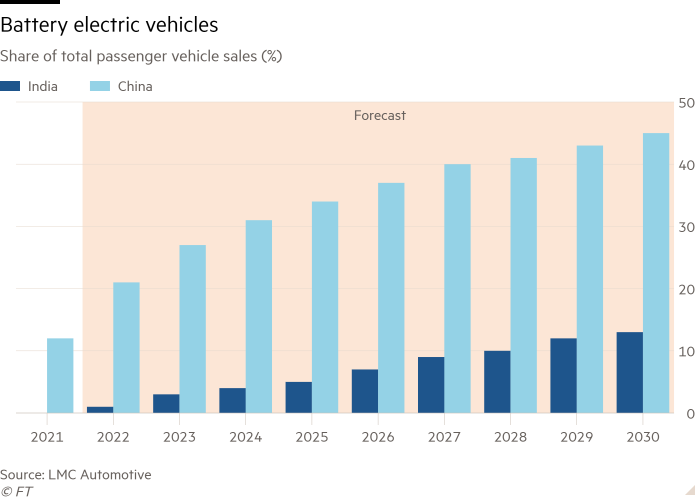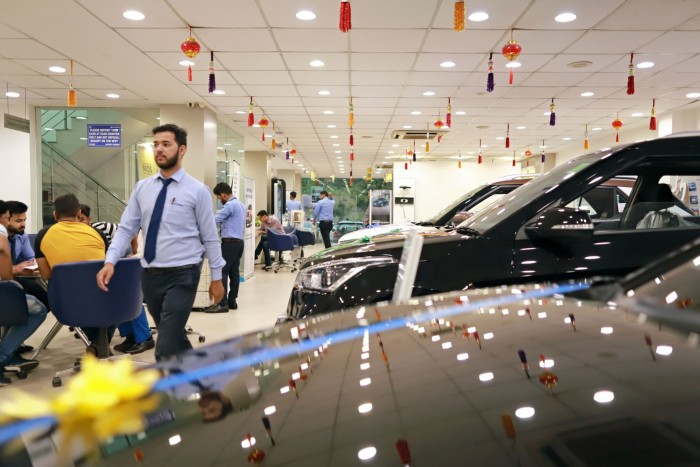India’s electric vehicle market glides into gear from standing start
India’s electric vehicle sector is gearing up from a standing start. Boosted by state subsidies, some early sales of delivery vehicles and buses and paranoia among businesses and politicians about China’s high-tech dominance, a “Made in India” EV industry is starting to take shape.
Alongside semiconductors and renewable energy, Narendra Modi’s government is offering incentives to producers of EVs and the advanced technologies that power them as it seeks to stimulate manufacturing, cut reliance on Chinese imports and attract foreign investment.
“As companies across the world look increasingly at a ‘China Plus One’ strategy, India is in a great position to become a global manufacturing powerhouse, and that journey has begun,” said Anjali Singh, executive chair of Anand, an Indian auto components and systems group pushing into EVs and other emerging automotive technologies. “It may take some time, but the aim is to match China soon.”
At this month’s Auto Expo 2023, India’s leading biennial motor show, Tata Motors was among the carmakers showing EVs, some 45,000 to 50,000 of which it says it will sell this year, making it India’s top seller of battery powered cars.
Foreign brands are targeting India too, including China’s own EV frontrunner BYD, which said it aimed to sell 15,000 vehicles and become India’s number two EV brand this year.
The carmaker, China’s top battery-powered brand, which currently assembles vehicles from kits in Chennai, told the Financial Times that it might expand its manufacturing footprint in India after 2025 if demand for its vehicles warranted it.

Underscoring India’s growing significance to global carmakers, according to preliminary data it probably became the world’s third-largest passenger vehicle market in 2022, behind China and the US and surpassing Japan, with 3.72mn units sold, a 24 per cent increase year on year, according to LMC Automotive, the consultancy.
“India’s battery electric vehicles market is nascent right now, but holds promise thanks to supportive government policies at both the central and state levels that offer incentives for both the supply and demand sides,” said Ammar Master, LMC’s director of south Asia.
The coming of zero-emission targets in European countries could also be a “chance to export small-sized EVs from India”, he said.
However, industry participants acknowledge that India’s carmakers will need to work hard to keep up with China, much less assert leadership in a field where not only its Asian rival but the US and some European countries far outspend it on state subsidies for producers and buyers of plug-in cars.
LMC forecasts that battery electric vehicle passenger vehicle sales in India will rise from about 5.5 per cent of total volumes in 2025 to 13.5 per cent by 2030. In China that share will rise from 34 per cent in 2025 to 45 per cent of the total by 2030, it forecasts.

India has no domestic production of lithium batteries, the main technology powering the current crop of electrified cars, the most expensive component in them. Unlike China, it does not mine lithium.
“The EV market in India is primarily an assembly market,” said Rajat Verma, founder and chief executive of Lohum, a company that recycles used automotive batteries and extracts the raw materials for producing cathode materials. “Seventy per cent of the value of what we are selling here in India is being produced in China.”
India has to date offered companies investing in battery cell technology just over $2bn in government incentives, and more than $1bn of subsidies targeting the faster adoption of EVs, Verma says.

Adding to the doubts about EVs in India — as elsewhere in the world — carmakers, suppliers, and policymakers are in large part still hedging their bets as to whether battery-powered vehicles or another technology will end up dominating the future market for lower-emission cars.
India’s cabinet recently also approved a “National Green Hydrogen Mission”, aimed at making the country a hub for production and export of hydrogen fuel.
In India, as in most other countries, forecasters expect most car buyers to stick with petrol and diesel cars with internal combustion engines for the near future, in part because of the higher price premium EVs command. Thanks in part to the subsidies, demand for EVs has taken off first and fastest among buyers of two- and three-wheeled vehicles, analysts and vehicle makers said.
“This is a very price sensitive market,” said Uday Narang, chair and founder of Omega Seiki Mobility, one of India’s rising producers of EVs, which makes electric two- and three-wheelers and delivery trucks. “You cannot look at India through European or American eyes.”
Indian consumers have been reluctant to splash out on battery-powered cars, Tata Motors recently began selling an electric version of its Tiago hatchback that only costs about $800 more than the petrol version.
Climate Capital

Where climate change meets business, markets and politics. Explore the FT’s coverage here.
Are you curious about the FT’s environmental sustainability commitments? Find out more about our science-based targets here